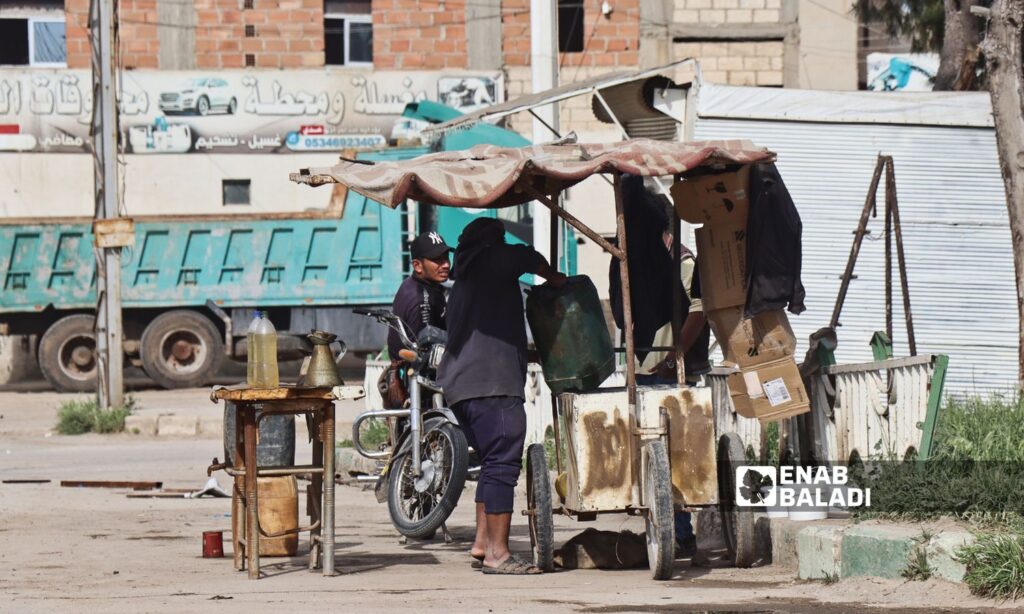The price of diesel has witnessed an unprecedented surge in the city of Ras al-Ain, northwestern al-Hasakah, with the price of a barrel exceeding USD 160 (approximately 2.5 million Syrian pounds or 5,840 Turkish lira).
This increase is attributed to the limited arrival of diesel via smuggling routes from areas controlled by the Syrian Democratic Forces (SDF) to Ras al-Ain, where the Syrian National Army (SNA) holds sway.
Economic and agricultural sectors paralyzed
In the past four years, the price of a barrel (200 liters) ranged from USD 100 to 120, imposing heavy financial burdens on residents and creating challenges for various sectors reliant on diesel for operations.
Mustafa al-Sabe, a farmer from Haroubi village west of Ras al-Ain, stated that the sharp increase in diesel prices has paralyzed his agricultural work, as he primarily relies on a diesel engine to irrigate his land.
He added, speaking to Enab Baladi, that the cost of operating the engine has doubled beyond his capacity to bear, and with the current rise in diesel prices, it has become impossible to secure the necessary quantities for regular irrigation hours.
If the increase persists, it poses a real threat to the region’s crops, especially for farmers who rely on fuel due to their inability to install solar energy systems.
Meanwhile, Kamal Ezzedin, a bakery owner in Ras al-Ain, mentioned that the increase in diesel prices affected his daily operations, compelling him to raise the prices of his products to cover the elevated operating costs.
He pointed out that the bakery requires at least 600 liters of diesel daily, equating to approximately USD 500 and called for the opening of an official passage connecting the areas to allow the entry of essential materials, especially fuel.
Tightening by the SDF
A worker involved in smuggling fuel from the dividing areas between the SDF and the National Army informed Enab Baladi that fuel entry into Ras al-Ain has become nearly impossible due to restrictions imposed by the SDF on the M4 international highway separating them for over a month and a half.
He explained that smugglers previously purchased more than 40,000 liters of diesel daily from the buffer zone, but the quantities reaching them now do not exceed 2,000 liters daily. This is due to the SDF closing most smuggling routes, causing a severe shortage of diesel in the markets.
He further stated that diesel prices continue to rise, potentially reaching approximately USD 200 per barrel if these constraints persist.
There are no fixed fuel prices in Ras al-Ain, with ongoing fluctuations due to the limited arrival and difficulty in securing it from areas controlled by the SDF through unofficial (smuggling) means.
A liter of regular diesel (refined in burners) is sold for 12,000 Syrian pounds; refined diesel and heavy diesel used for heating and cooking are priced at 10,000 Syrian pounds per liter, while European and Turkish diesel is priced at 17,000 Syrian pounds per liter (the average exchange rate is 15,000 Syrian pounds per dollar).
Daily labor wages range between 80,000 and 100,000 Syrian pounds, with most of the area’s approximately 115,000 residents engaged in farming and livestock breeding.
The separating area between SDF and National Army-controlled regions in Ras al-Ain, al-Hasakah – October 3, 2024 (Enab Baladi)
Deprived of fuel
Ziad Maliki, a spokesperson for the local council, stated that the rise in diesel prices in Ras al-Ain is due to what he described as the SDF’s policy of besieging the region and preventing it from obtaining its share of the underground wealth present in oil fields.
Maliki explained that the local council has diligently provided Turkish fuel sufficiently for the area, but the variance in prices has not received the anticipated response from residents.
He added that Syrian diesel prices have risen multiple times, particularly with the approaching winter season.
He noted that the local council is currently working on finding emergency solutions, most importantly subsidizing fuel and providing it through Turkish companies at prices suitable for industrial and agricultural entrepreneurs and even residents.
From time to time, fuel crises recur in Ras al-Ain, notably in August 2023, when the city and its vast countryside experienced significant shortages due to the interruption of most fuel types.
Stalls selling fuels along the roadsides in Ras al-Ain have become a livelihood source for a large segment of the population amid deteriorating living and economic conditions. During a tour in central Ras al-Ain, an Enab Baladi correspondent observed more than 30 stalls selling fuels, alongside three major gas stations.
Ras al-Ain is situated along the Turkish border, controlled by the National Army, and is surrounded by frontline battles with the SDF, with the Turkish border being its only outlet to the outside.

